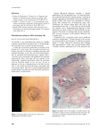 223 citations,
September 2018 in “Rheumatology”
223 citations,
September 2018 in “Rheumatology” JAK inhibitors are effective in treating various immune-related diseases, not just rheumatoid arthritis.
 1 citations,
April 2021 in “Journal of The American Academy of Dermatology”
1 citations,
April 2021 in “Journal of The American Academy of Dermatology” The commentary suggests that certain hair and skin care products may be linked to frontal fibrosing alopecia, but not sunscreens, and calls for more thorough research on the causes.
[object Object]  15 citations,
May 2011 in “Veterinary Dermatology”
15 citations,
May 2011 in “Veterinary Dermatology” Vitamin A might be a safe extra treatment for dogs with sebaceous adenitis, but more research is needed to prove its effectiveness.
 February 2024 in “PloS one”
February 2024 in “PloS one” Tofacitinib and adalimumab are promising treatments for cicatricial alopecia with few side effects.
 April 2018 in “Journal of Investigative Dermatology”
April 2018 in “Journal of Investigative Dermatology” BLZ-100 is safe for use in skin cancer surgery and may help identify cancerous tissue.
20 citations,
March 2021 in “Drug design, development and therapy” Topical immunotherapy can treat alopecia areata, but its effectiveness varies and the exact mechanism is unclear.
 April 2018 in “Journal of Investigative Dermatology”
April 2018 in “Journal of Investigative Dermatology” High amphiregulin in the skin is a bad sign for acute graft-versus-host disease.
 3 citations,
March 2011 in “Informa Healthcare eBooks”
3 citations,
March 2011 in “Informa Healthcare eBooks” Acne in children varies by age and severity, requires a pediatric treatment approach, and may need diagnostic evaluation for underlying conditions.
 December 2023 in “Regenerative therapy”
December 2023 in “Regenerative therapy” miRNA-based therapies show promise for treating skin diseases, including hair loss, in animals.
 80 citations,
April 2018 in “Trends in Molecular Medicine”
80 citations,
April 2018 in “Trends in Molecular Medicine” Lichen Planopilaris and Frontal Fibrosing Alopecia may help us understand hair follicle stem cell disorders and suggest new treatments.

 April 2019 in “Journal of The American Academy of Dermatology”
April 2019 in “Journal of The American Academy of Dermatology” 
 51 citations,
July 2008 in “Dermatologic Therapy”
51 citations,
July 2008 in “Dermatologic Therapy” The document concludes that surgery is a preferred treatment for cicatricial alopecia, with the method chosen based on individual factors and may require multiple sessions and careful postoperative care.
1 citations,
December 2023 in “Life” PRP helps skin heal, possibly through special cells called telocytes.
 April 2012 in “Informa Healthcare eBooks”
April 2012 in “Informa Healthcare eBooks” The document concludes that diagnosing hair loss requires evaluating multiple histological features, as no single feature is definitive on its own.
[object Object] 31 citations,
July 2021 in “ImmunoTargets and therapy” Alopecia areata is an incurable autoimmune condition causing hair loss, with research aiming for better treatments.
 July 2002 in “Australasian Journal of Dermatology”
July 2002 in “Australasian Journal of Dermatology” A woman with lupus had hair loss and skin issues that were successfully treated with medications.
 41 citations,
February 1970 in “Archives of Dermatology”
41 citations,
February 1970 in “Archives of Dermatology” Oral contraceptives can cause skin issues like dark patches, acne, yeast infections, sensitivity to light, spider veins, skin rashes, and hair loss.
 March 2017 in “BIRDEM Medical Journal”
March 2017 in “BIRDEM Medical Journal” Sarcoidosis can cause various skin issues, making diagnosis difficult.
9 citations,
August 2014 in “Lupus” Early diagnosis and quick treatment are crucial for severe lupus cases.
 28 citations,
July 2002 in “Australasian Journal of Dermatology”
28 citations,
July 2002 in “Australasian Journal of Dermatology” Lupus can look like hair loss from alopecia areata but needs different treatment.
 September 1997 in “Journal of The European Academy of Dermatology and Venereology”
September 1997 in “Journal of The European Academy of Dermatology and Venereology” Examining scalp tissue under a microscope helps diagnose and understand hair loss diseases.
 June 2024 in “British Journal of Dermatology”
June 2024 in “British Journal of Dermatology” Scalp disease in dermatomyositis causes significant symptoms and has unique features.
3 citations,
November 2022 in “The Egyptian Rheumatologist” Macrophage activation syndrome can be a deadly first sign of systemic lupus erythematosus.
 13 citations,
February 2006 in “Clinical and Experimental Dermatology”
13 citations,
February 2006 in “Clinical and Experimental Dermatology” A benign tumor developed at a girl's BCG vaccination site, not previously linked to the vaccine.
 January 2021 in “Anais do Congresso Brasileiro de Reumatologia 2020”
January 2021 in “Anais do Congresso Brasileiro de Reumatologia 2020” Tofacitinib improved arthritis and partially improved hair loss in a lupus patient without side effects.
 January 1983 in “Journal of The American Academy of Dermatology”
January 1983 in “Journal of The American Academy of Dermatology” The book is a valuable resource for understanding hair and scalp problems but could be updated with more information on certain conditions.
 2 citations,
May 2014 in “Journal of the Egyptian Women's Dermatologic Society (Print)”
2 citations,
May 2014 in “Journal of the Egyptian Women's Dermatologic Society (Print)” Dermoscopy helps diagnose different scalp conditions by showing unique signs for each disorder.
 18 citations,
January 1999 in “CNS Drugs”
18 citations,
January 1999 in “CNS Drugs” Some anticonvulsant drugs can cause skin reactions, ranging from mild to severe, and managing these reactions is important for patient care.

























